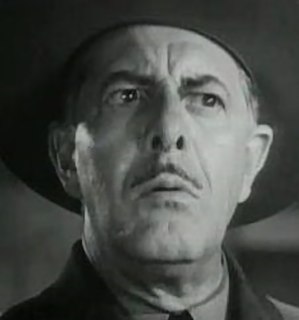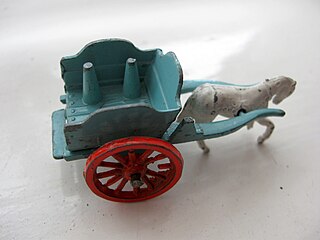Related Research Articles

Matchbox is a popular toy brand which was introduced by Lesney Products in 1953, and is now owned by Mattel, Inc, which purchased the brand in 1997. The brand was given its name because the original die-cast "Matchbox" toys were sold in boxes similar to those in which matches were sold. The brand grew to encompass a broad range of toys, including larger scale die-cast models, plastic model kits, slot car racing, and action figures.

Airfix is a British brand and former manufacturing company which produced injection-moulded plastic scale model kits of different vehicles. In the U.K., the name 'Airfix' is synonymous with plastic models of this type, often simply referred to as "an airfix kit" even if made by another manufacturer.

Louis Marx and Company was an American toy manufacturer in business from 1919 to 1980. They made many types of toys including tin toys, toy soldiers, toy guns, action figures, dolls, toy cars and model trains. Some of their notable toys are Rock'em Sock'em Robots, Big Wheel tricycles, Disney branded dollhouses and playsets based on TV shows like Gunsmoke. Its products were often imprinted with the slogan "One of the many Marx toys, have you all of them?"
The Ives Manufacturing Company, an American toy manufacturer from 1868 to 1932, was the largest manufacturer of toy trains in the United States from 1910 until 1924, when Lionel Corporation overtook it in sales.
Bassett-Lowke was an English toy manufacturing company based in Northampton. Founded by Wenman Joseph Bassett-Lowke in 1898 or 1899, that specialized in model railways, boats and ships, and construction sets. Bassett-Lowke started as a mail-order business, although it designed and manufactured some items.

A toy soldier is a miniature figurine that represents a soldier. The term applies to depictions of uniformed military personnel from all eras, and includes knights, cowboys, American Indians, pirates, samurai, and other subjects that involve combat-related themes. Toy soldiers vary from simple playthings to highly realistic and detailed models. The latter are of more recent development and are sometimes called model figures to distinguish them from traditional toy soldiers. Larger scale toys such as dolls and action figures may come in military uniforms, but they are not generally considered toy soldiers.

A die-cast toy is a toy or a collectible model produced by using the die-casting method of putting molten lead, zinc alloy or plastic in a mold to produce a particular shape. Such toys are made of metal, with plastic, rubber, glass, or other machined metal parts. Wholly plastic toys are made by a similar process of injection molding, but the two methods are distinct because of the properties of the materials.
Corgi Classics Limited is a British die-cast scale model manufacturer established as an independent company in 1984, which has its origins in the Corgi Toys brand introduced by Mettoy in 1956. It is known for its British and North American vehicle models.
Art toys, also called designer toys, are toys and collectibles created by artists and designers that are either self-produced or made by small, independent toy companies, typically in very limited editions. Artists use a variety of materials, such as ABS plastic, vinyl, wood, metal, latex, plush, and resin. Creators often have backgrounds in graphic design, illustration, or fine art, but many accomplished toy artists are self-taught. The first art toys appeared in the 1990s in Hong Kong and Japan. By the early 2000s, the majority of art toys were based upon characters created by popular Lowbrow artists, linking the two movements.
Lesney Products & Co. Ltd. was a British manufacturing company responsible for the conception, manufacture, and distribution of die-cast toys under the "Matchbox" name. The company existed from 1947 until 1982.
Britains, earlier known by the founder's name W. Britain, is a British toy brand and former manufacturing company known for its die-cast scale model of agricultural machinery, and figurines. The company was established in 1893 as a toy soldiers manufacturer.

Roy Paul Harvey was a prolific American character actor who appeared in at least 177 films.
Permanent mold casting is a metal casting process that employs reusable molds, usually made from metal. The most common process uses gravity to fill the mold, however gas pressure or a vacuum are also used. A variation on the typical gravity casting process, called slush casting, produces hollow castings. Common casting metals are aluminium, magnesium, and copper alloys. Other materials include tin, zinc, and lead alloys and iron and steel are also cast in graphite molds.
John Hill & Company or Johillco was a British toy company specialising in the manufacture of hollowcast metal and later plastic toy soldiers becoming second to W. Britain in popularity. No one knows where the name of John Hill came from.
Georg Fischer comprises three divisions GF Piping Systems, GF Casting Solutions, and GF Machining Solutions. Founded in 1802, the Corporation is headquartered in Switzerland and is present in 33 countries, with 140 companies, 57 of them production facilities. Its approximately 15 000 employees generated sales of CHF 4.57 billion in 2018. GF offers pipes for the safe transport of liquids and gases, lightweight casting components in vehicles, and high-precision manufacturing technologies.

Benbros (London) Ltd was a British toy company in existence from the late 1940s to 1965.
Manoil Manufacturing Company was an American metal and plastic toy company that began production in 1935 or 1936, and left the business in 1959. From June 1940 they were located on Providence Street, in Waverly, NY. Its prominence was from 1937-1941 when it produced hollowcast toy soldiers along with toy airplanes and cars.
Upstate New York has been the setting for inventions and businesses of international significance. The abundance of water power and the advent of canal and rail transportation provided nineteenth century Upstate New York entrepreneurs with the means to power factories and send their products to market. In the twentieth century, hydroelectric power and the New York State Thruway served the same roles. In April 2021, GlobalFoundries, a company specializing in the semiconductor industry, moved its headquarters from Silicon Valley, California to its most advanced semiconductor-chip manufacturing facility in Saratoga County, New York near a section of the Adirondack Northway, in Malta, New York.
Bean Brothers was a company based in Adelaide, South Australia involved in tanning, leathergoods and shipping ventures in the latter half of the 19th century. Bean Brothers Ltd was set up by the principals to consolidate their assets and develop as wool and produce brokers. They also founded the Adelaide and Port Darwin Sugar Company to develop a sugar plantation in the Northern Territory of Australia. Both ventures failed amid acrimony, recrimination and lawsuits.

William P. Bettendorf was a German-American inventor. He is credited with the invention of the power lift sulky plow, the Bettendorf metal wheel and the one-piece railroad truck frame. By the age of 53 he held 94 patents. With his younger brother, Joseph W. Bettendorf, he founded the Bettendorf Axle Company. His first wife and children preceded him in death. He died as the company was rapidly expanding and before he moved into a palatial home he was building. The city of Bettendorf, Iowa is named after the two brothers.
References
- ↑ "Crescent Figures". Archived from the original on 2008-09-18. Retrieved 2008-10-25.
- ↑ "Gathering the Jewels". www.gtj.org.uk. Retrieved 2016-07-29.
- ↑ "Mikes Diecast Tanks and Armour". www.mikes-tanks.com. Retrieved 2016-07-29.
- ↑ p.93 Joplin, Norman The Great Book of Hollow Cast Figures 1993 New Cavendish Books
- ↑ "Shop Online at Stanley Gibbons | Home of Stamp Collecting". Archived from the original on 2012-09-11. Retrieved 2008-10-25.